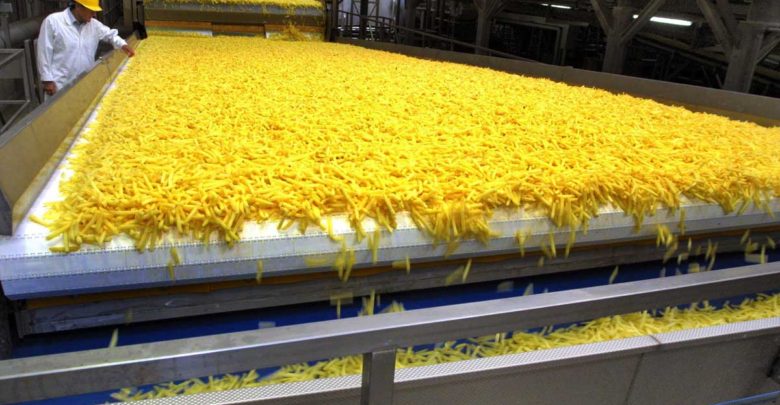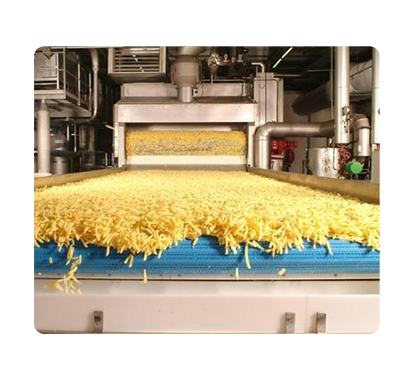Mashroo3k Consulting Company offers a feasibility study for a frozen and semi-fried potato factory project in Egypt, ensuring the highest profitability and the best payback period. This is achieved through a set of detailed studies on the size of the Egyptian market, analysis of local and foreign competitor strategies, and providing competitive pricing offers.

The semi-fried and frozen potato factory produces French fries through several stages, including sorting, washing, peeling, cutting, drying, freezing, and more. Potatoes are considered the third most important food crop in the world after rice and wheat. Mashroo3k Consulting views the Sultanate of Oman as a promising investment environment for industrial projects.
Mashroo3k Consulting ensures that the semi-fried and frozen potato factory project in Egypt is equipped with the latest production lines and advanced manufacturing technology, in addition to relying on a marketing team capable of developing creative strategies to open new markets.



Executive summary
Study project services/products
Market Size Analysis
Risk Assessment
Technical study
Financial study
Organizational and administrative study

The Gulf Cooperation Council (GCC) countries comprise 0.7% of the world’s population; however, they account for 3% of global spending on processed food and beverages, totaling 102 billion USD out of 3.4 trillion USD. This indicates a higher per capita food consumption in the region, surpassing the global average. This is not surprising, considering that the GCC population now exceeds 58 million people, with approximately 56.3% of them falling within the age group of 25 to 54 years. This age group forms the most dynamic and youthful segment, making it a vital driver for the food industries.
Since Saudi Arabia represents around 59.7% of the total population in the GCC, and its share of the food and beverage market exceeds 53%, Mashroo3k Consulting has decided to present key market indicators for this vital sector in the Kingdom, based on the latest available statistics:
By the end of the second quarter of 2021, the number of food product factories was estimated at 916, with 249 factories under construction. As for beverage factories, there were 209, with 71 factories under construction.
Food product factories represent 11.1% of the total number of active and producing factories (8,258 factories), while beverage factories represent 2.5% of the total number of factories in the Kingdom.
The Saudi food and beverage market was estimated to be worth 168.8 billion SAR.
By the end of 2021, the food consumption market size reached 221 billion SAR, with a growth rate of 6%.
According to global reports, the value of food consumption in Saudi Arabia is 70 billion USD, which represents 60% of the total food consumption in the Gulf region.
The fast food market in Saudi Arabia is expected to reach 4.5 billion USD in the next three years.
The market for organic, health, and specialized food in Saudi Arabia is valued at 27 billion USD, and the halal food market is valued at 6 billion USD.
Saudi Arabia’s annual food and beverage imports are estimated at around 14.5 billion USD.
In 2020, operating expenses for food and beverage services were estimated at 34.03 billion SAR, up from 30.07 billion SAR in 2018.
Revenue from food and beverage services in 2020 was estimated at 61.56 billion SAR, up from 54.87 billion SAR in 2018.
Operating expenses for food and beverage services are expected to reach 52.49 billion SAR by 2027, with revenues expected to reach 92.08 billion SAR by 2027.
The total expected operating revenue for the food products industry in Saudi Arabia in 2027 is 128.54 billion SAR.
Global Food Sector:
According to UNICEF, the global malnutrition index rose to 9.8% in 2021.
Between 702 and 828 million people suffer from hunger worldwide.
Food market revenues globally are approximately 8.66 trillion USD.
7.8% of total food market revenues will be generated online.
The total global production of primary crops is 9.4 billion tons.
Global production of red and white meat totals 337 million tons.
Global fruit production totals 883 million tons.
Global vegetable production totals 1.128 billion tons.
Global production of vegetable oils totals 201 million tons.
Global dairy production totals 883 million tons.
Global egg production totals 83 million tons.
